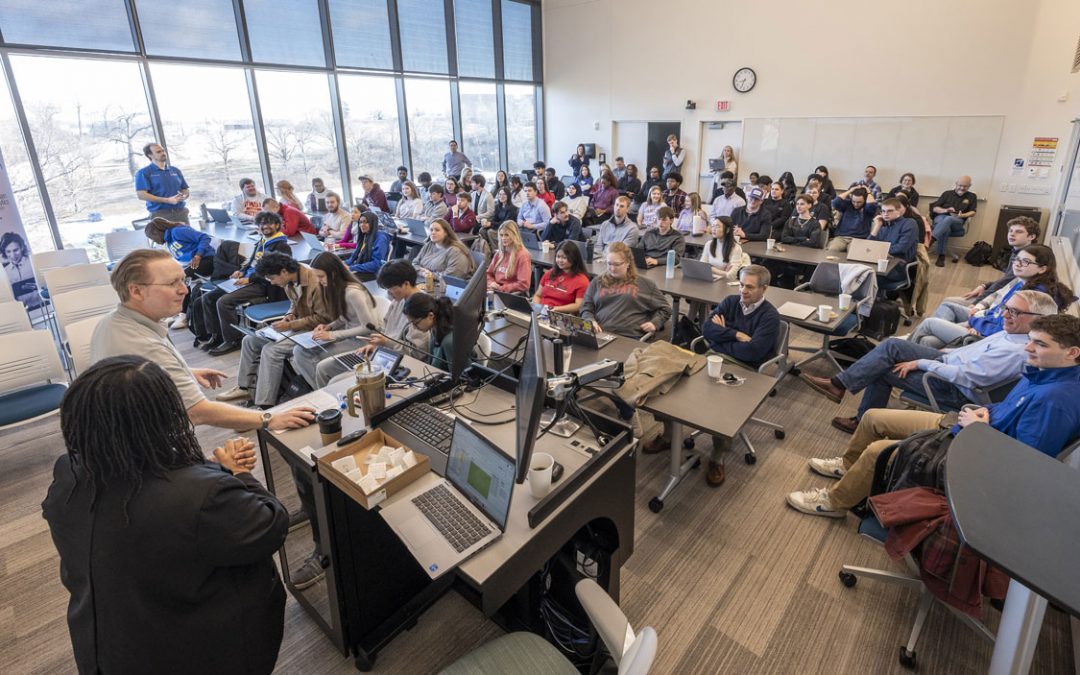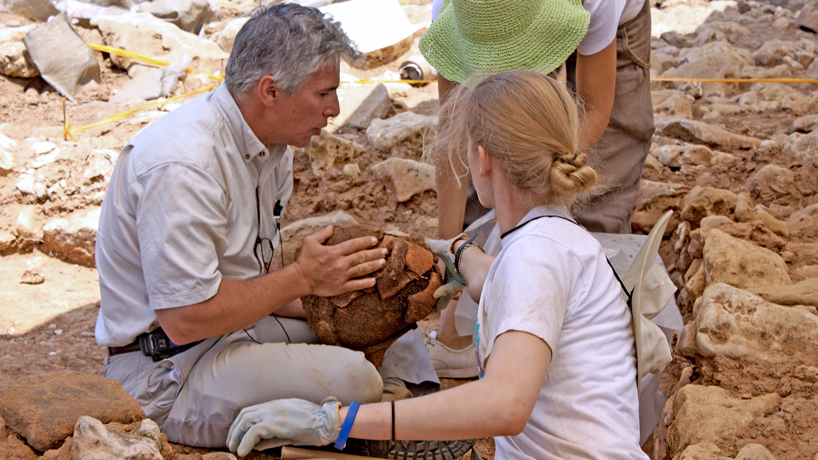
Hellenic Government-Karakas Foundation Endowed Professor in Greek Studies Michael Cosmopoulos (left) has excavated the remains of ancient cultures alongside UMSL students for more than two decades. (Photo courtesy of Michael Cosmopoulos)
For two and a half decades, Michael Cosmopoulos has taken students to Greece where they immerse themselves in a rich intersection of history, archeology and mythology.
“Travel allows students to get to know other cultures and appreciate both the differences and similarities to their own,” said Cosmopoulos, the University of Missouri–St. Louis Greek Studies professor. “When our students travel, they are exposed to other traditions, customs and social circumstances. In turn this expands their minds and helps them to develop critical thinking.”
Cosmopoulos has facilitated student growth and engagement by inviting study abroad groups to work on the Iklaina Archeological Project, an interdisciplinary research project conducted in Pylos, Greece, that aims to discover more about Mycenaean civilization.
English alumna, Assistant Professor of English at Saint Charles Community College and part-time UMSL Gender Studies faculty member Bryonie Carter traveled with the Greek Studies program in 2005 and 2006. Along with field school in Pylos and excursions to Athens, she noted the journey to Cape Sounion as a major point of interest.
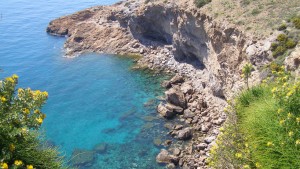
Surrounded by Helichrysum flowers, this cliff on Cape Sounion is where historians believe the Athenian king Aegeus leapt to his death after believing his son Theseus had died fighting the Minotaur. (Photo courtesy of Bryonie Carter)
“Greek myths were my childhood bedtime stories, so traveling to Greece was a great opportunity to see where these stories originated,” she said. “Cape Sounion is a crucial setting in the myth of Theseus and the Minotaur. In that story, after Aegeus, King of Athens, believes his son Theseus has died fighting the Minotaur, he jumps off a cliff in grief. This is why the sea that surrounds Cape Sounion is called the Aegean Sea. When I visited the temple of Poseidon at Cape Sounion, I went to the very cliff where Aegeus might have jumped — or at least this is where archeologists would believe he jumped. Although myths have symbolic and literary value, connecting that value to a concrete place makes the myths more real.”
Cosmopoulos also believes in the lasting power Greek myths have in culture throughout history.
“The most important contribution of Greek culture is that it helps us to understand our humanity. To make this knowledge accessible, the Greeks used stories that are timeless and useful today,” he said. “The story of the Trojan War, presented in Homer’s epic poem the Iliad, is a story about war and violence, and how it impacts our personalities. It is not an accident that the United States Department of Veterans Affairs uses the Iliad to help veterans with Post-Traumatic Stress Disorder.”
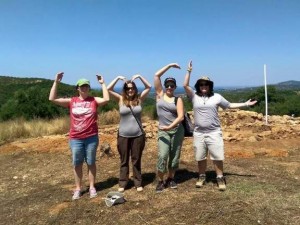
Under the guidance of Cosmopoulos in the summer of 2015, senior anthropology major Corri Mader (second from left) expanded her archaeological skills alongside fellow UMSL students. (Photo courtesy of Corri Mader)
While Carter used the Greek Studies program as a pathway to intensify her focus on symbolism, literature and language, senior anthropology major Corri Mader’s study abroad experiences have firmly rooted her career path in archaeology.
“The exposure that I got from the studying in Greece made me more competent in my abilities as an archaeologist,” Mader said. “Archaeology combines the best parts of psychology and history, allowing you to study the past through material remains, and I guess that’s what drew me to it.”
Mader participated in the Iklaina Archeological Project over the summer of 2015 and got her hands dirty unearthing artifacts.
“There’s a lot of dirt to go through, and you’re mostly worried about excavating as gently as possible, but then at the end, you’ve exposed a skeleton. You’re standing over someone’s final resting place. And you think about how the skeleton is posed. Are the arms crossed? Is it in a fetal position? Is it lying on its back? The pose and how the skeleton is perverted tells you about the culture, and when you find more, you’re going to be able to give this find a story.”
Years of providing students with unforgettable experiences has earned the Greek Studies program high praise. In honor of the program’s 20th anniversary celebrated on Feb. 3, U.S. President Barak Obama and the President of Greece Prokopis Pavlopoulos wrote letters lauding the program’s commitment to culture and education.
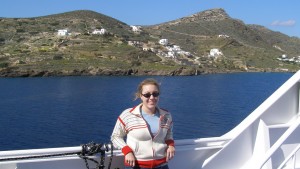
In 2006, Bryonie Carter took a ferry ride through the Mediterranean that helped her realize her desire to explore how myth, symbolism and language define culture and humanity. (Photo courtesy of Bryonie Carter)
While Cosmopoulos mines the past for knowledge, he keeps an eye on the future and continuing the goals of the Greek Studies program.
“We are now at a crossroads as universities tend to reduce the teaching of humanities and liberal arts for the sake of skills-only education,” he said. “Greek Studies stands firmly by what the true mission of the university is: to create educated citizens with critical thinking.”
Whether lessons are learned in the past, present or future, Carter thanks the Greek Studies program for experiences that motivate her to this day.
“I took a nine hour ferry ride to Santorini, and I remember just feeling a sense of wonder as we passed these little homes and beautiful windmills on the island of Ios. In the middle of the Mediterranean, I realized how lucky I was to be there, and it really changed me,” she said. “What Dr. Cosmopoulos was able to provide us with was so inspiring. My students probably get sick of my saying ‘when I was in Greece…’”















